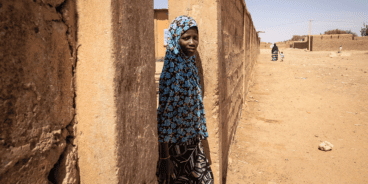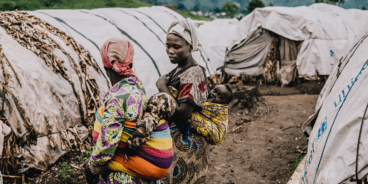
Atrocity Alert No. 158: Mali, Iraq, Philippines and South Sudan
Atrocity Alert is a weekly publication by the Global Centre for the Responsibility to Protect highlighting situations where populations are at risk of, or are enduring, mass atrocity crimes.
Massacre in Mali as inter-communal violence continues to grow
At least 95 civilians were killed in an attack on the village of Sobanou-Kou in the Mopti region of central Mali late on the night of Sunday, 9 June. The attack targeted ethnic Dogon villagers, who constitute the majority of the population of Sobanou-Kou. According to reports, around 50 unidentified armed assailants surrounded the village before setting it on fire and then shooting civilians attempting to flee. Many of the bodies of the dead were also reportedly burned. At the time of publication, no group has claimed responsibility for the attack.
Inter-communal violence has been increasing in the Mopti region over the past several years, particularly between the Dogon and Fulani populations. According to the latest UN Secretary-General’s report on the peacekeeping mission in Mali (MINUSMA), the central area of Mali continues to record the largest number of civilian casualties in the country.
During an earlier attack in the Mopti region on 23 March, traditional “Dozos” hunters – mainly from the ethnic Dogon community – killed at least 157 villagers in the majority-Fulani community of Ogossagou. Similar attacks on other Fulani communities have been attributed to the Dan Na Ambassagou militia, a Dozos self-defense group that was originally formed to protect locals from Islamist armed groups. While the Malian government has banned Dan Na Ambassagou and called for its members to disarm, the organization has refused.
While there is a history of inter-communal tensions between Fulani and Dogon communities over access to land, water and grazing rights, the recent increase in violence in the Mopti region has been linked to the expanding activities of armed Islamist groups. These groups have exploited the flow of weapons across porous borders and have often recruited fighters from the Fulani/Peuhl community, exacerbating tensions. The UN Special Representative in Mali condemned Sunday’s attack as an “act of unspeakable barbarity,” stressing that “in this spiral of violence, there are not the bad guys on one side and the good guys on the other. Everyone is responsible. The threshold of the intolerable is reached.”
The Malian government, with the support of MINUSMA, must immediately investigate the massacre at Sobanou-Kou and ensure that those responsible for inciting, directing and committing the attack are held accountable. The government should also work to reestablish dialogue between Fulani and Dogon communities and prioritize local disarmament, demobilization and reintegration efforts. As the UN Security Council prepares to renew MINUSMA’s mandate later this month, Council members should bear in mind the threat of recurring identity-based violence and potential mass atrocity crimes in the Mopti region.
Crop fires and “scorched earth” tactics in Syria and Iraq
Since early May the armed extremist group the Islamic State of Iraq and the Levant (ISIL) has claimed responsibility for the burning of more than 20,000 acres of wheat and barley in eastern Syria and nearly 134,000 acres of land in Iraq. The burning of crops is a form of ecological and economic warfare, with the intent of depriving and destroying local civilians’ livelihood and increasing food insecurity. Hussain Attiya, a farmer from Topzawa Kakayi in northern Iraq, said in an interview with the Associated Press that, “If the situation continues like this, I would say that no one will stay here.”
ISIL’s role in the burning of crops demonstrates that it continues to pose an ongoing threat to civilians. On 6 June Iraqi authorities also announced that they would begin identifying the remains of 141 people exhumed from mass graves in Sinjar, where ISIL carried out a genocide against the Yazidi minority during 2014. Despite numerous captured ISIL members being tried and hanged under Iraq’s harsh counter-terrorism laws, no ISIL member has ever been held legally accountable for mass atrocity crimes perpetrated against Yazidis, Christians and other minority populations in northern Iraq.
Satellite imagery has also confirmed that crops are burning in northwestern Syria, where the governments of Syria and Russia continue their military offensive against opposition-held areas of Idlib Governorate. On 4 June the World Food Programme spokesperson, Hervé Verhoosel, said that the fires are “clearly linked to the bombing,” and asserted that it is not acceptable to hold the local “civilian population hostage.” The burning of crops is just one of a number of tactics endangering the lives of nearly three million civilians in Idlib, including ongoing airstrikes that have damaged or destroyed 24 health facilities and 35 schools, and the use of illegal and indiscriminate barrel bombs.
“Scorched earth” policies, including the deliberate burning or bombing of civilian crops, constitute war crimes. Civilian populations bear the brunt of such crimes, which attempt to deprive them of the means of survival. Those responsible for these acts, whether they be non-state armed groups or state forces, should be held accountable under international law.
UN experts call for investigation of extrajudicial killings in the Philippines
On 7 June a group of eleven UN Special Rapporteurs called upon the Human Rights Council to establish an international investigation into ongoing human rights violations in the Philippines. The expert group, including the Special Rapporteur on extrajudicial, arbitrary and summary executions, Agnes Callamard, said that “we have recorded a staggering number of unlawful deaths and police killings in the context of the so-called ‘war on drugs,’ as well as killings of human rights defenders.” The experts further stated that they have brought their concerns to the Philippine government on 33 occasions over the last three years, but to no avail. “The Government has shown no indication that they will step up to fulfill their obligation to conduct prompt and full investigations into these cases, and to hold perpetrators accountable in order to do justice for victims and to prevent recurrence of violations.”
The joint statement comes nearly three years after President Rodrigo Duterte took office on 30 June 2016. Since then, according to the Philippines government’s own figures, over 5,000 people have been killed in anti-drug operations. However, according to the Philippine Commission for Human Rights and other rights groups, the actual number of victims is between 20,000 and 30,000 people.
In response to the killings two complaints have been filed against President Duterte and other government officials at the International Criminal Court (ICC). The Prosecutor of the ICC, Fatou Bensouda, also opened a preliminary investigation in March 2018. Shortly thereafter, the Philippines announced their withdrawal from the Court.
While the government of the Philippines has sovereign authority to maintain law and order within its borders, including by punishing those who deal in illegal drugs, it is obligated to do so with respect to International Human Rights Law. During its 41st session later this month, the Human Rights Council should establish an independent international investigation as recommended by the Special Rapporteurs.
Civilians targeted in fighting between government and NAS rebel group in South Sudan
On 26 May violent clashes broke out around Yei, Central Equatoria State, between South Sudanese government forces and the National Salvation Front (NAS), an armed group led by former General Thomas Cirillo. As part of a wider campaign against the rebel group, on 26 and 27 May government forces, allegedly supported by allied militias, launched attacks on NAS bases in Lainya and Wonduruba.
The NAS is not a part of the Revitalized Agreement on the Resolution of the Conflict in the Republic of South Sudan (R-ARCSS) that was signed in September 2018, ending more than five years of civil war. Although armed violence has generally declined in South Sudan since then, sporadic clashes between government forces and the NAS have continued.
Human Rights Watch recently reported that between December 2018 and March 2019 government forces committed large scale human rights violations and abuses against civilians during operations aimed at eliminating the NAS in Yei River State. Jehanne Henry, Associate Africa Director of Human Rights Watch, stated that “Civilians are being targeted, killed, and raped, as government operations try to root out rebels.” The operations have also caused widespread civilian displacement, with the UN Refugee Agency estimating that 5,000 people have fled to the Democratic Republic of the Congo. Local authorities also registered 14,000 internally displaced persons during February.
Government forces must immediately stop targeting vulnerable civilians during operations against the NAS. All those responsible for human rights violations and abuses must be held accountable, irrespective rank or affiliation. Ending impunity is essential for the full implementation of the R-ARCSS and building a sustainable peace process in South Sudan.
Related Publications


